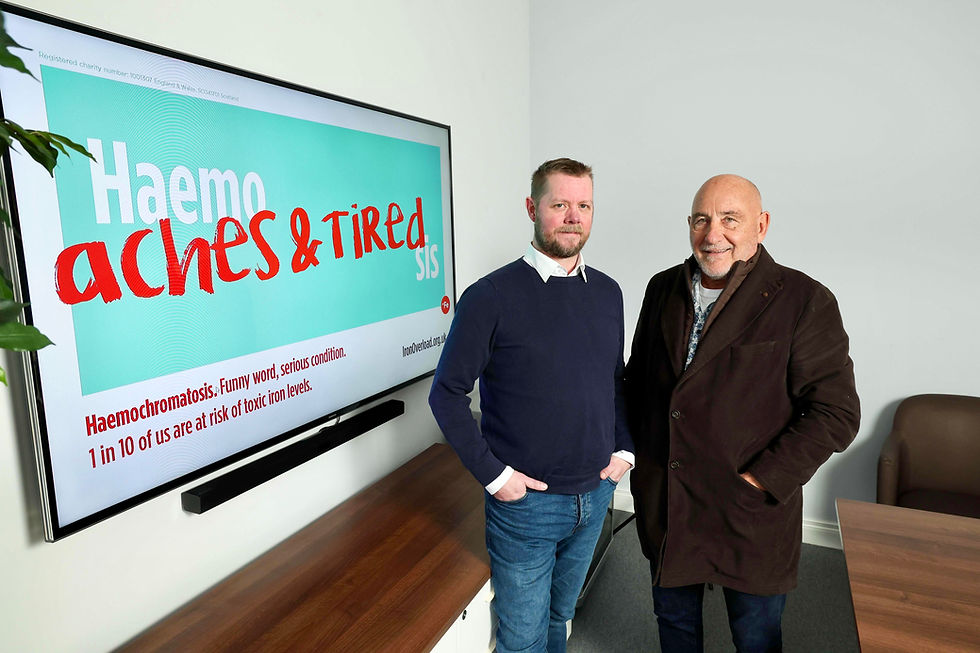Northern Ireland hospitals welcome 26 new Emergency Medicine Consultants to tackle growing pressures
- Love Ballymena

- May 27, 2025
- 4 min read

(L-R): Dr Andrew Dobbin, Clinical Director Unscheduled Care, Dr Christina Mulholland ED Consultant, Dr Daniel Mullally ED Consultant, Dr Russell McLaughlin, VP RCEM & Consultant and Clinical Director in Emergency Medicine Belfast Trust, Health Minister Mike Nesbitt, Prof Lourda Geoghegan Deputy CMO and Brian McFetridge, Assistant Director of Unscheduled Care at South Eastern Trust.
In a significant step towards alleviating the mounting pressures on Northern Ireland’s hospital emergency departments, Health Minister Mike Nesbitt has announced the recruitment of up to 26 new Emergency Medicine Consultants.
These highly skilled professionals will take up posts across all five geographic Health and Social Care (HSC) Trusts by the end of 2025, bolstering the region’s healthcare system and reducing reliance on costly locum doctors.
The initiative, a collaborative effort between the Department of Health, HSC Trusts, and the Royal College of Emergency Medicine (RCEM), aims to ensure newly qualified consultants have clear pathways to employment within the HSC.
Funding for these posts has been secured by redirecting resources previously spent on locum cover, which cost the HSC approximately £30 million annually.
Health Minister Mike Nesbitt highlighted the urgency of addressing the challenges faced by emergency departments.
“We’re all acutely aware of the very significant pressures on our hospital Emergency Departments. Both staff and patients want us to do all we can to alleviate those pressures and that’s been a central focus for my Department and Trusts in recent months,” he said.
“Stabilising our current workforce and strengthening our future workforce is an important part of our work across the HSC system.”
Nesbitt noted that the previous lack of consultant vacancies for newly qualified specialists was unsustainable, particularly given the high expenditure on locum doctors.
“At a meeting with the RCEM last year, I recognised that it was incongruous for the HSC to be putting specialist Emergency Medicine doctors through training and then having no vacancies for them when they qualified, while at the same time spending around £30m a year on locum cover for Emergency Departments,” he explained.
He tasked Departmental officials with working alongside Trusts and the RCEM to create opportunities for these specialists, funded within existing budgets.
A Strategic Move to Strengthen Emergency Care
The recruitment drive is already yielding results, with some consultants already in post and others progressing through the hiring process. The new consultants will be deployed across Northern Ireland’s five HSC Trusts—Belfast, Northern, Southern, South Eastern, and Western—based on clinical and staffing needs.
This strategic allocation aims to address disparities in emergency care provision and enhance patient outcomes.
Professor Lourda Geoghegan, Deputy Chief Medical Officer, welcomed the early impact of the initiative.
“I am very encouraged by early reports from Trusts where new Consultants have taken up post - about not only a reduction in spending on medical locums, but also the added benefit of increasing the presence of senior decision-making in EDs where staff continue to work under considerable pressure,” she said.
Geoghegan suggested that this approach could be extended to other medical specialties, highlighting its potential to transform workforce planning across the HSC.
Dr Russell McLaughlin, Vice President for RCEM Northern Ireland, praised the Department of Health’s response to the critical shortage of emergency medicine consultants.
“We would like to thank the Health Minister and the Department of Health for responding to our call to strengthen the consultant workforce and future proof the Emergency Medicine specialty,” he said.
McLaughlin cited a recent RCEM census that revealed a stark shortfall, with Northern Ireland having only one consultant per 7,786 emergency department attendances—half the recommended number.
“The need for expansion is clear – it’s vital our departments have these senior decision makers, who are qualified and ready to step into these roles, which are critical for patient safety,” he added.
Impact on Patient Care and Hospital Efficiency
The recruitment of these consultants is expected to have a transformative effect on Northern Ireland’s emergency departments, which have faced significant challenges due to rising demand and staffing shortages.
Dr Andrew Dobbin, Clinical Director of Unscheduled Care in the South Eastern Health and Social Care Trust, underscored the value of the new appointments.
“In the past six months, five new Emergency Medicine consultants have been recruited in the Trust, working across the Downe, Lagan Valley and Ulster Hospitals,” he said.
“These are doctors who have undertaken a robust training scheme over a minimum of six years, across many sites, gaining specialised expertise. Their expertise means they can make faster, more accurate decisions about patient care, improving waiting times and patient outcomes as well as reducing admissions to hospital, which can relieve the significant pressure on the wider hospital system.”
The presence of these highly trained professionals is expected to reduce waiting times, improve diagnostic accuracy, and decrease unnecessary hospital admissions, thereby easing the strain on the broader healthcare system. By prioritising substantive employment over agency staff, the HSC is also working towards a more sustainable and cost-effective workforce model.
A Broader Commitment to Workforce Sustainability
This recruitment drive is part of a wider effort by the Department of Health and HSC Trusts, in collaboration with trade unions and representative groups, to reduce reliance on agency and locum workers.
Initiatives include frameworks for the substantive employment of nurses, midwives, and healthcare support workers, as well as the complete cessation of agency workers in social work roles. These measures reflect a commitment to building a resilient HSC workforce that delivers safe, high-quality care while ensuring value for money.
As Northern Ireland’s healthcare system continues to navigate unprecedented challenges, the addition of up to 26 new Emergency Medicine Consultants marks a pivotal step towards a more robust and responsive emergency care framework.
With a focus on workforce stability and patient safety, this initiative signals a promising future for the region’s hospitals and the communities they serve.








